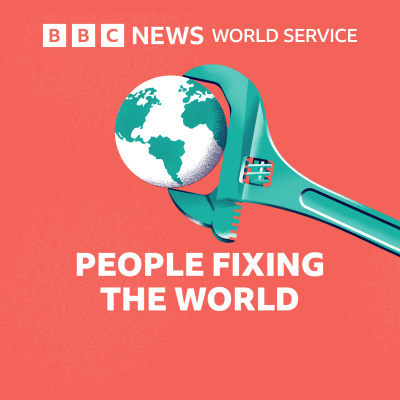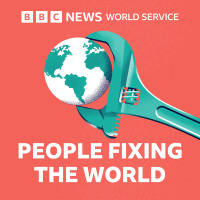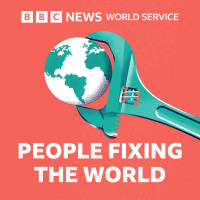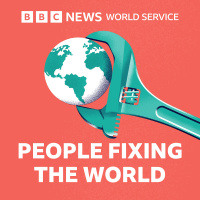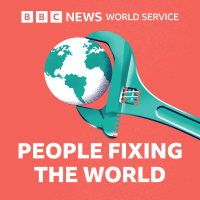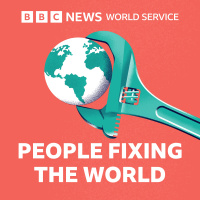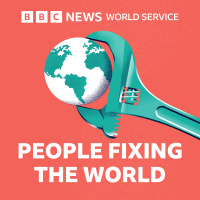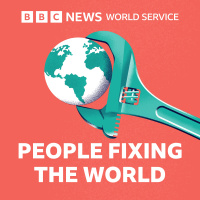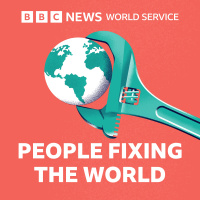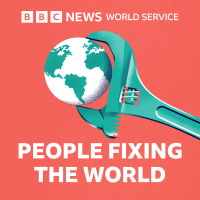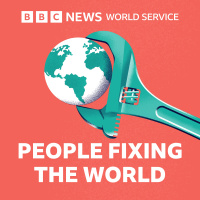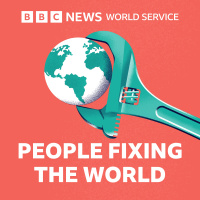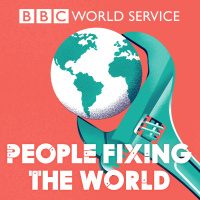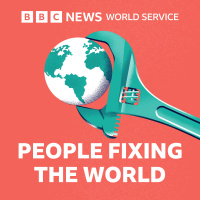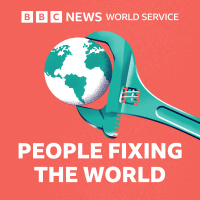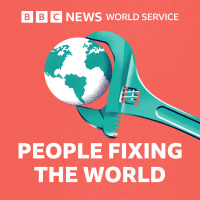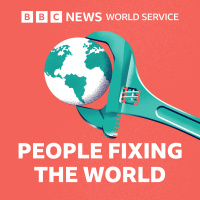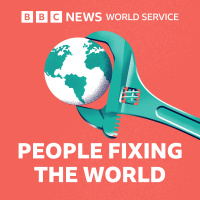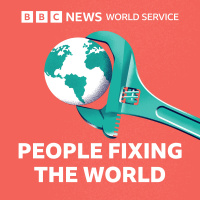Sinopsis
Brilliant solutions to the worlds problems. We meet people with ideas to make the world a better place and investigate whether they work.
Episodios
-
Prison Voicemail: Messages from behind bars
04/08/2020 Duración: 24minThe Prison Voicemail app connects inmates and their families, helping them stay in touch throughout a sentence. We hear a mum and daughter using the messages to rebuild their relationship, and find out how it helps children who are separated from their dad. Producer/ reporter Ruth Evans
-
Financing the forests
28/07/2020 Duración: 26minProtecting the rainforest could make people millions of dollars under a pioneering new scheme.Bankers and conservationists have teamed up to regrow a large area of Indonesia’s jungle where endangered orangutans and tigers live. Reporter: Jo Mathys Image: An orangutan (Getty Images)
-
Life-saving surgery, but not by a doctor
21/07/2020 Duración: 24minNurses and midwives in Ethiopia are being trained to perform emergency operations, saving thousands of lives.People Fixing the World follows one of them, Seida Guadu, as she operates to try to save the lives of a mother and her unborn child.This podcast was first published on 25 June 2019.Reporter: Ruth Evans Producers: Lily Freeston and Hadra Ahmed
-
New uses for old solutions
14/07/2020 Duración: 29minTwo life-saving apps have been adapted to fix problems caused by the Covid-19 pandemic - hear how ideas we’ve visited before have developed and grown.One of them has been helping ambulance drivers find their way to field hospitals; the other has been finding volunteers to run errands for people who are vulnerable. Presenter: Daniel Gordon Reporters: Ruth Evans, Nick Holland and Richard Kenny Picture credit: Getty Images
-
How to get everyone online
07/07/2020 Duración: 24minFrom balloons in the stratosphere to swarms of satellites in space, the race to get everyone online is heating up. The internet may never be more useful than during the coronavirus outbreak. It provides us with the latest health information, educates our kids and lets us communicate with our loved ones face to face. But only half of the world’s population is online. Tech evangelists around the world are trying to change that. Using balloons and satellites, soon even the most remote areas on Earth will be able to log on. But there is more to getting everyone online than the strength of the signal. People Fixing the World investigates. Produced and presented by Tom CollsImage: Loon
-
A future without bees
30/06/2020 Duración: 24minTech companies have developed drones to drop pollen on orchards or shoot it at crops through pipes from tractors. They’re responding to a crisis in insect pollination as studies suggest numbers of both wild pollinators and farmed bees are declining. This could have a serious knock-on effect on how we grow our fruit and veg. But some experts argue high-tech alternatives are a short-term solution to a much bigger and long-term problem. Presented and produced by Claire Bates
-
How tech is tackling wildlife trafficking
23/06/2020 Duración: 24minNew technology is helping in the fight against wildlife poaching. Computer scientists have created a programme that uses artificial intelligence to predict where poachers are going to strike; a new generation of smart cameras is catching the criminals red-handed; and the latest police forensic techniques are being adapted to investigate these crimes. The aim is to put a stop to the illegal trade of wildlife trafficking, which is worth billions of dollars and is threatening the survival of species such as elephants, rhinos and tigers. Each year 20,000 elephants are killed for their ivory, according to WWF estimates. Reporter and producer - Richard Kenny for BBC World Service
-
Personality tests for loans
16/06/2020 Duración: 24minA short online test that reveals attitudes, opinions and thought processes is being used to help decide whether to give people loans. The idea is to use psychometric tests to give people with little or no credit history a better chance of getting support and investment. New ways of providing financial services are needed because 1.7 billion people have no access to any kind of formal banking facilities, according to the World Bank. Known as the unbanked, they deal only in cash. This can make it harder to reduce poverty, save money or invest for the future. Cheap mobile phones and good network coverage in Nigeria are also transforming the lives of people who previously only dealt in cash. Presented and produced by Anisa Subedar Picture credit: Getty Images
-
Kids fixing the world
09/06/2020 Duración: 24minThis week we look at four brilliant inventions by children: a phone app to stop drivers missing road signs; a robot that is activated when a vulnerable person falls over; a tool to help fire departments predict the likelihood of wildfires, and a way to make your fish tank double as a vegetable patch for microgreens.The future engineers and scientists behind these innovations are aged between 12 and 16 and were all entrants in the UK’s Big Bang Competition. Head judge Helena Dodd joins William Kremer to discuss what makes a winning design, and what grown-ups everywhere can do to unleash the problem-solving power of the next generation.Reported and produced by William Kremer.Picture: Freddie with Fallbot
-
No more bosses
02/06/2020 Duración: 23minCan companies operate better without managers? We hear from people who’ve got rid of managers and say it has helped them do a better job, made them happier and saved money. But there are pitfalls, too. Co-ordination and hiring talent for what are usually considered top management jobs can be a challenge when there’s no traditional hierarchy.Produced and presented by Dina Newman.Picture credit: Getty Images
-
The ancient technology getting a second wind
26/05/2020 Duración: 24minOld ships, powered by the wind, are sailing small amounts of cargo around the world again to help cut pollution. Some of them were built more than 100 years ago. The shipping industry moves 80% of traded goods around the planet. But the diesel engines that propel modern cargo ships through the oceans burn the dirtiest type of fuel. Nick Holland speaks to sailors and brokers who, for the sake of the environment, are breathing new life into these vintage vessels. And he hears how new types of sails could get monster-sized modern cargo ships using the wind as well. Producer / Reporter: Nick Holland
-
Electricity that grows on trees
19/05/2020 Duración: 24minScientists in Italy have discovered that trees generate an electrical charge every time the wind blows strongly enough to make their leaves touch one another.The researchers, from the Italian Institute of Technology, have managed to harvest enough energy this way to power 150 LED lights from a single leaf.We meet them, and others, who are trying to make use of untapped, natural sources energy. We hear from a project trying to produce electricity from the interaction of fresh and salt water where rivers meet the sea.And we talk to a geologist in Iceland, who’s helped dig nearly 5km beneath the surface of the Earth. At that depth, the temperature can be about 600C - the idea is to mine the heat and turn it into energy. Producer/Reporter: Daniel Gordon Picture: Getty Images
-
The breath of life
12/05/2020 Duración: 23minA clever invention is saving the lives of hundreds of children. Pneumonia kills about 1.4 million children under five every year. Treatment with concentrated oxygen could save many of them, but the machines that make it need a reliable source of electricity. Some hospitals have frequent power cuts, though, which can be fatal. So scientists in Australia and Uganda came up with an innovative way to produce oxygen by separating it from the rest of the air, using a vacuum created by running water. Then they designed special bags that can store and deliver oxygen – even when the electricity cuts out. Their systems have provided oxygen for hundreds of sick children in Uganda. People Fixing the World hears the story of these remarkable inventions. Produced and presented by Ruth EvansPicture credit: Peter Casamento
-
A Sporting Chance
05/05/2020 Duración: 24minWe all know that sport is great for our health - and if you’re talented it can bring you great riches. But this week we look at how sport is changing lives and giving hope to young people leading the toughest lives. In Cape Town, South Africa, a British surfer noticed how kids from poor townships hardly ever went to the beach. So he started giving them free surfing lessons. Now hundreds go along each week to get “surfing therapy”. Not only is surfing giving them a buzz, it's helping to improve their life chances. In Afghanistan we meet the people who have brought skateboarding to the streets. As well as being an exciting challenge, it’s giving girls in particular a safe place to do sport and changing their outlook on life. And in one of the more deprived parts of London we find out how horse riding - a sport normally associated with the elite - is now inspiring young people from all backgrounds. Reporter/Producer: Richard Kenny
-
The great spreadsheet in the sky
28/04/2020 Duración: 24minThere’s a technology on the block which has the power to change all kinds of things for the better. If that power is harnessed, it has the potential to end corruption, protect your online identity and a whole lot more. Start-up companies and charities are using it in everything from tuna supply chains to medical records and ID documents and everything in between. The technology is blockchain and on this episode of People Fixing the World, we’ll explore whether its great potential can be realised. Produced and presented by Tom Colls Image: Blockchain illustration (Getty Images)
-
The farmers moving their fields indoors
21/04/2020 Duración: 23minWe visit farmers growing lettuce, herbs and strawberries indoors in the middle of cities. The plants are stacked up on shelves in vertical farms that use hydroponics and aeroponics to cultivate them.The idea is to grow food closer to where it’s eaten. At the moment, cities get most of their produce delivered from far away, but transporting it uses energy, while fruit and veg can lose their freshness in transit. We visit two European companies hoping to change the supply chain. One makes indoor farming units for food retailers, restaurants and hotels, and the other grows strawberries in shipping containers on the outskirts of Paris. We find out if these pioneers of European urban farming are able to feed our growing cities. Produced and presented by Dina Newman.Picture credit: Getty Images
-
Making the world a quieter place
14/04/2020 Duración: 25minPeople around the world are coming up with ways to make the world a quieter place, from portable sound barriers to schemes to stop people honking their car horns.The trouble is that noise from traffic, railways, builders, even neighbours, can have a huge impact on our health and wellbeing, according to the World Health Organization.One of the solutions we look at reduces decibel levels around building sites and music festivals, while another collects acoustic data to help local councils enforce laws if people are being too noisy. Also, a woman in India is doing her bit to reduce noise levels on the streets of Mumbai. Presented and produced by Anisa Subedar Picture credit: Getty Images
-
The big transport swap
07/04/2020 Duración: 23minRobot shuttles and buses on demand are being tested to persuade more people to use public transport. Tallinn in Estonia and Luxembourg have even made travel free. The aim is to tackle the impact of one billion cars on the world's roads, which have brought some cities to a virtual standstill. But in order to tempt people away from their cars new incentives are needed.Claire Bates tries out schemes that are being developed across Europe.Presented and produced by Claire Bates
-
Regrowing the rainforest
31/03/2020 Duración: 27minIt has taken him 40 years, but Omar Tello has turned a patch of exhausted farmland in Ecuador back into rainforest. One of his biggest challenges was repairing the soil. His land was so degraded he had to make enough new soil - from unwanted wood shavings and chicken manure - to cover the entire plot. That alone took about 15 years. He also travelled deep into the Amazon for days at a time, looking for seeds and plants he could rescue. Now his forest is flourishing and the wildlife has returned - it is home to snakes, toucans, monkeys and many other animals. And he is sharing what he has learned to encourage others to protect the rainforests instead of cutting them down. Presented and produced by Jo Mathys.
-
The treasure in our toilets
24/03/2020 Duración: 24minHuman sewage contains lots of valuable nutrients, so should we be recycling it? One of these nutrients is phosphorus, a key ingredient in fertiliser. We need fertilisers to meet the demands of the planet’s growing population, but there is a limited supply of phosphorus. Once it finds its way into the sea it becomes impossible to recover. And yet we all excrete about half a kilogram of the stuff a year, making cities a potentially rich source of the element. In the Netherlands human sludge is already being processed to recover phosphorus and recycle it into a high-tech fertiliser which will not leach into the environment. Reporter: William Kremer Photo: Getty images
